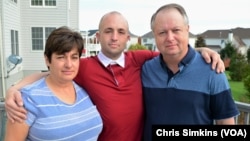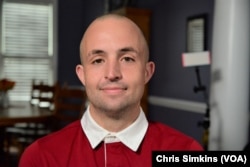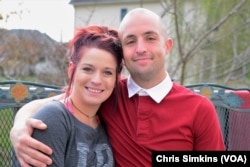Virginia Delegate John Bell politely greets people at a town hall meeting, asking them about their concerns, which range from local road repairs to women’s rights to affordable health care. His focus in the Virginia General Assembly, however, has been battling the opioid addiction crisis that has been sweeping the nation.
It all started when his son, Josh, became an addict.
“He was in a car accident seven years ago and in the car accident he injured his neck,” Bell said. “And when he came out of the emergency room, he came out with an opioid prescription for 90 days, with five refills.” By the time his son finished the first prescription, he was addicted.
WATCH: For American Politician, Opioid Issue is Personal
Unlikely addict
Josh, who lives in Texas, says unscrupulous caregivers helped fuel his addiction.
“The doctors never took an X-ray or a CAT scan ... all they did was the doctor looked at my neck for a second and then he gave me some Vicodin.
“I remember when I got home that night and I took it … it’s like the first time experiencing love.”
That’s when Josh developed an opioid addiction, which quickly turned from expensive pain pills to heroin.
“Heroin at that point saved me so much money, and the high was so powerful, I felt like I felt early in my addiction. It just got terrible from there.”
Josh says his addiction became so bad, “I was just doing whatever I needed to support my habit.”
The 32-year-old’s life started to crumble. His wife left him and he lost his job.
“I couldn’t enjoy anything because all I cared about was trying to get heroin,” he said.
Pill mills
Josh sought help at pain management clinics, but says it was a deeply disappointing experience.
“The doctors spent very little time with us as patients,” he recalled. “We never talked about recovery, we never talked about therapy. ... There were no warnings; they never told me that this was going to be leading to something greater than this or that I’m going to keep wanting more.
“They made me feel bad whenever I asked questions. So it was a pill mill is basically what it was,” he said.
Josh remembers the huge waiting area where he was surrounded by others struggling with addiction.
“Everyone was just sitting there hurting, and by the time you had the prescription in your hands, you were already experiencing a high ((because)) you know you are about to get back into your addiction full force,” he said.
During his entire ordeal, Josh’s family was unaware of what he was going through.
“Looking back,” his father said, “we didn’t really understand the addiction and we didn’t know what signs to look for to know he was addicted during this period.” But when he did find out, Josh says his father “literally flew down to Texas that day and that’s when my road to recovery started.”
A family disease
“When I visited him and he explained to me what had been going on, the first thing I told him is that I loved him and I supported him,” the elder Bell said. “Drug addiction or any addiction is commonly called a family disease. And I think that’s an accurate description because it’s not just the person who’s addicted who suffers, it’s the whole family,” he added.
Josh was lucky. Many who misuse opioids lack family or other support systems to help them deal with their addiction.
Opioid overdoses killed about 64,000 people in the United States in 2016, making it the leading cause of death for Americans younger than 50. And opioid addiction is rising.
That’s why having a support network in place is so important, John Bell said.
“Once someone becomes addicted to a drug — and with many opioids it can happen in a matter of five to seven days — there no longer is a choice; it’s a disease,” he said.
Bell and his wife, Margaret, found help and support to deal with their son’s disease from Nar-Anon. Known officially as “Nar-Anon Family Groups,” the organization is a 12-step program for friends and family members who are affected by someone else’s addiction.
Along with the emotional cost and social stigma associated with addiction — families are often reluctant to talk about the issue with others — they struggle with the high cost of treatment. While there are programs that provide assistance, it simply isn’t enough, John Bell said. He and his family spent thousands of dollars for Josh, but acknowledges not all families are as fortunate. He wants more programs for low-income families.
Effective legislation
As a state lawmaker, Bell has tried to use his experience and position to bring about change, often working with experts in the legal and medical professions.
“We put in a limit on how many pain pills can be prescribed for acute pain at the emergency room,” he said. They also put in money into Narcan, a nasal mist spray that, if administered quickly, reverses the effect of an opioid overdose. “So $2.4 million was put towards that so we make sure all of our first responders have the ability to provide that life-saving drug,” he said.
Life-saving measures
Those efforts are already having an impact.
Fatal heroin overdoses in Bell’s district of Loudoun County, Virginia, decreased 27 percent compared with the same time last year. And nonfatal overdoses decreased 14 percent over the same time period, according to Loudoun County Sheriff Mike Chapman.
Bell, who recently won reelection in his district, says he’s just getting started.
“Because this is a problem that spans age groups,” he said. “I have met 13-year-old children who are addicted; I met a 78-year-old grandmother who is addicted, and everything in between.”
“I’m no one special,” Bell said. “I’m just someone who has a son who suffers from addiction. And there are so many people like me. And the more we can share this story, the more we can take this out of the shadows and get it out into a place where we can do some good with it and help those who are struggling.”
Josh Bell has been sober for nine months and is eager to use his experience to help others.
“All we want to do is once we find recovery is help someone else find recovery because we know how dark it was, and how good it feels not to live a lie anymore,” he said.








